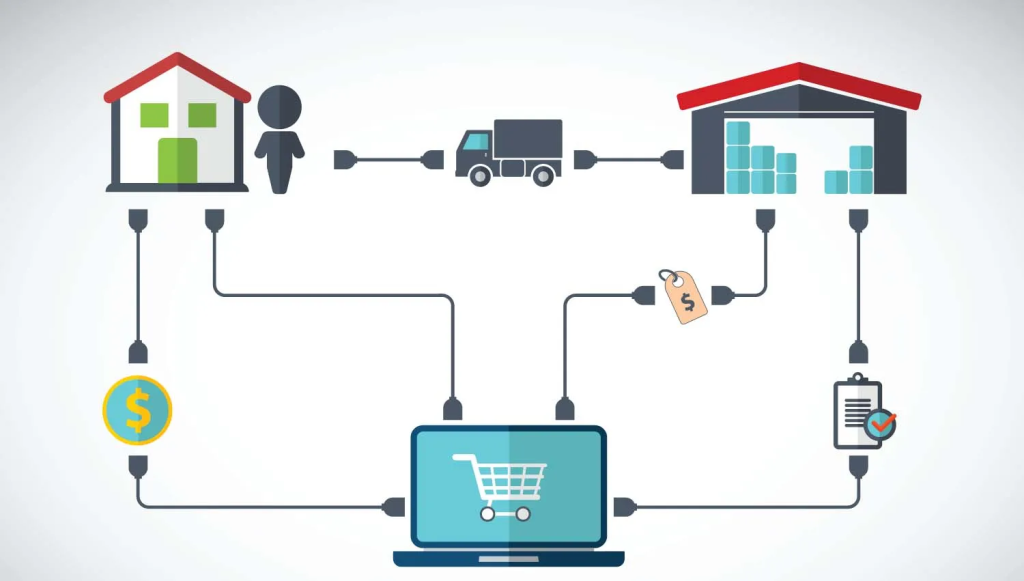Introduction
Reselling can be an excellent way to make money. But choosing the right supplier is crucial. A good supplier can make your business thrive, while a bad one can lead to losses. In the world of reselling, there are two main options: wholesale suppliers and dropshipping suppliers. This post will compare these two models to help you decide which is best for your reselling journey.
What Are Wholesale Suppliers?
Definition of Wholesale Suppliers
Wholesale suppliers sell products in bulk at a lower price. They often provide items to retailers at discounted rates. This allows resellers to purchase many goods at a lower cost per unit. This model can be beneficial for resellers who want to maximize their profits.
How Wholesale Suppliers Work for Resellers
Working with wholesale suppliers involves a straightforward process. First, you find a supplier that meets your needs. Next, you purchase products in bulk. After that, you need to store and manage your inventory. Finally, you handle the shipping when customers place orders. It sounds simple, but there’s a bit more to it.
Pros of Working with Wholesale Suppliers
Lower Cost Per Unit
One of the main benefits of working with wholesale suppliers is the lower cost per unit. When you buy in bulk, you get discounts. This means more profit for you when you sell the products.
Greater Control Over Inventory
Wholesale suppliers give you more control over your inventory. You can decide how much stock to keep and when to reorder. This allows you to run your firm more efficiently.
Ability to Customize Packaging and Branding
With wholesale suppliers, you can customize packaging and branding. This is essential for building your brand identity. You can create a unique customer experience, leading to repeat business.
Better Margins for High-Volume Sales
Wholesale suppliers can be your best friend if you plan to sell many products. Higher volumes can lead to better margins, which means more money in your pocket. Successful resellers turn to good stuff distributors to find the right products at great prices.
Cons of Working with Wholesale Suppliers
Need for Upfront Investment
One downside to wholesale suppliers is the need for upfront investment. You have to pay for your inventory before selling it. This can be a barrier for new resellers who may not have a lot of capital.
Storage and Warehousing Costs
Once you buy your inventory, you need space to store it. This means potential storage and warehousing costs. It can be a challenge if can be a challenge if you don’t have the right direction.
Risk of Unsold Inventory
Buying in bulk also comes with the risk of unsold inventory. You don’t get stuck with excess stock if a product doesn’t sell. This can lead to losses and wasted money.
Handling Shipping and Logistics Yourself
With wholesale suppliers, you are responsible for shipping and logistics. This might be time-consuming and demand additional resources. It can create headaches if can create headaches if you don’t have a good I don’t in place.
What Are Dropshipping Suppliers?
Definition of Dropshipping Suppliers
Dropshipping is different from wholesale. With drop shipping, you don’t keep any inventory. Instead, when a customer orders, you send that order to the supplier. They send the product immediately to the customer. This model requires less upfront investment and storage space.
How Dropshipping Suppliers Work for Resellers
Setting up a dropshipping business is quite simple. You find a dropshipping supplier, list their products on your site, and wait for orders. When a customer buys anything, you forward the order to the supplier. They arrange for the merchandise to be shipped directly to the customer. This means you can focus more on sales and marketing rather than logistics.
Pros of Working with Dropshipping Suppliers
No Inventory or Upfront Costs
One of the most significant advantages of dropshipping is that you don’t need to buy idolatry upfront. This means you can start a business with little to no capital.
Low Barrier to Entry for New Resellers
The dropshipping model has a low barrier to entry. Anyone can start a dropshipping business without much money or experience. This makes it an excellent choice for beginners.
Focus on Marketing and Sales
With drop shipping, you can focus on what you do best: marketing and sales. You don’t have to worry about managing inventory or shipping products. This might lead to increased sales and growth for your company.
Easy to Scale with Minimal Risk
Scaling a drop shipping business is more accessible. Since you don’t hold inventordon’tu, you can quickly add new products. Plus, you won’t risk holding won’t-unsold stock.
Cons of Working with Dropshipping Suppliers
Lower Profit Margins
Dropshipping usually comes with lower profit margins. Since suppliers handle shipping, they charge fees. This can eat into your profits compared to wholesale.
Lack of Control Over Shipping and Packaging
When dropshipping, you lose control over shipping and packaging. This can affect the customer experience. If a supplier doesn’t package it, it doesn’t; it reflects poorly on your business.
Possible Stock Availability Issues
Dropshipping suppliers may run out of stock. If that happens, you might have to cancel orders or delay shipments. This can frustrate customers and hurt your reputation.
Limited Ability to Build a Brand
Since you don’t handle inventory shipping, it’s harder to build a unique brand. You can’t customize peccant as you would with wholesale suppliers. This can limit your branding opportunities.
Critical Differences Between Wholesale and Dropshipping Suppliers

Inventory Management
Wholesale: Requires Storage
With wholesale suppliers, you must manage and store inventory. This can take up space and require organization.
Dropshipping: No Need for Storage
On the other hand, dropshipping eliminates the need for storage. You only purchase products when customers order them.
Profit Margins
Wholesale: Higher Margins on Bulk Purchases
Wholesale usually offers higher margins. You buy in bulk and sell at retail prices, maximizing profits.
Dropshipping: Lower Margins Due to Supplier Costs
In contrast, dropshipping often means lower margins. Suppliers charge fees that can cut into your earnings.
Upfront Investment
Wholesale: Significant Upfront Capital Required
Buying inventory from wholesale suppliers requires an upfront investment. This can be a hurdle for many new resellers.
Dropshipping: Minimal or No Upfront Investment
Dropshipping needs minimal or no upfront investment. This makes it an appealing option for those just starting.
Control Over Branding and Packaging
Wholesale: Full Control Over Packaging and Presentation
Wholesale suppliers allow you to customize branding and packaging. This helps you create a unique customer experience.
Dropshipping: Limited or No Control Over Packaging
With drop shipping, you have limited control over how products are packaged. This can affect your brand’s image.
Shipbrand’sd Logistics
Wholesale: You Handle Shipping
When using wholesale suppliers, you’re in charge ofyou’reing. This means managing logistics, which can be time-consuming.
Dropshipping: Supplier Handles Shipping
Dropshipping suppliers handle shipping directly. This simplifies the process but reduces control.
Risk and Responsibility
Wholesale: Risk of Unsold Stock
With wholesale, there’s a risk of their stock. If products don’t sell, you can incur financial losses.
Dropshipping: Risk of Poor Supplier Reliability
Dropshipping comes with risks related to supplier reliability. If a supplier fails to deliver, it impacts your business reputation.
Which Option is Better for Resellers?
Factors to Consider When Choosing Between Wholesale and Dropshipping
Your Business Goals
First, think about your business goals. Are you looking to build a brand or make quick sales? Your goals will help determine which model fits you best.
Available Capital
Consider how much money you have to invest. Dropshipping might be the way to go if you’re on a tight you. However, wholesale can be more profitable if you have funds for bulk purchases.
Desired Profit Margins
Consider how much profit you want to make. Wholesale typically offers better margins, while dropshipping can have lower profits.
Level of Control You Want Over Your Business
What level of control do you want over your business? If branding and packaging are essential to you, wholesale is likely the better choice. If you’re okay with leyou’retrol, dropshipping can work.
Customer Experience and Branding
Customer experience is critical. If you want to create a strong brand presence, wholesale suppliers are advantageous. But if you prioritize speed and efficiency, dropshipping can be effective.
When Wholesale Suppliers Are the Better Choice
Established Resellers with Capital and Storage Facilities
Wholesale can be great for you if you’re established with capital and space for inventory. It allows for better profit margins and control.
Businesses Focused on Branding and Customization
Wholesale suppliers are ideal for those focused on branding. You can customize packaging and create a unique customer experience.
High-volume resellers Looking for Better Margins
If you’re selling a hiyou’reume of products, wholesale can help maximize profits. Buying in bulk leads to better margins. Many resellers seek out good stuff distributors for this very reason.
When Dropshipping Suppliers Are the Better Choice
New or Small-Scale Resellers
Dropshipping is excellent for new or small-scale resellers. It has low startup costs and minimal risk, making it easier to enter the market.
Resellers with Limited Capital or Space
Dropshipping is your friend if you lack the capital or space for inventory. You can start selling without worrying about storage.
Businesses Prioritizing Flexibility and Low Risk
If flexibility is a priority, dropshipping offers that. You can quickly adapt your product offerings without worrying about unsold stock.
Resellers Focused on Marketing and Sales Over Logistics
Finally, dropshipping is the way to go dropshipping is the way to go if you want to focus more on marketing and sales. You can put your energy into growing your business rather than logistics.
Conclusion
Choosing between wholesale and dropshipping suppliers depends on your business model and goals. Wholesale offers lower costs per unit, greater control, and better margins for those willing to invest. However, it also involves storage costs and the risk of unsold inventory. Dropshipping allows for low upfront costs and easier scaling but typically comes with lower margins and less control.
Before making a decision, consider your business’s demands. Whether you work with wholesale suppliers for resellers or explore dropshipping, the right choice will set you on the path to success. Good luck on your reselling journey!



